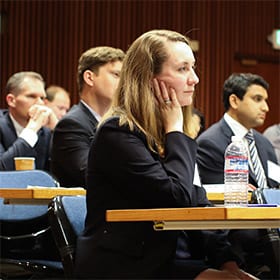By Susan Gluss

The financial services sector is in the midst of rapid change, due to advanced technologies that are driving innovation in mobile banking, securities transactions, data storage, and more. Simply put, checkbooks are out, and Venmo is all the rage. The latest technology disrupter, blockchain, may fundamentally alter business operations on a global scale, raising a host of legal, consumer, and regulatory issues.
Blockchain is described as a high-tech ledger of transactions originally developed to support the cryptocurrency bitcoin. But it’s quickly become the darling of multinational corporations eager to adopt it for their own needs: It’s a highly secure, decentralized and encrypted method of tracking digital assets.
But, as in any start-up space, the legal risks can be high, particularly for entrepreneurs unfamiliar with regulatory landmines or securities law. To train aspiring lawyers and business leaders in the promise and pitfalls of these financial technologies (“Fintech”), Berkeley Law is offering a new course cross-listed with UC’s business and engineering schools: Blockchain, Cryptocurrencies, and the Future of Technology, Business and Law.
Offered in spring 2018, the course limit is 60 students, 20 from each of the three professional schools. Law students snapped up their 20 seats in record time. The course is the brainchild of MacArthur Foundation Fellow and engineering Professor Dawn Song; business Professor Gregory LaBlanc; and Executive Director of the law school’s Berkeley Center for Law and Business, Adam Sterling.

“Blockchain is one of the most significant technologies to impact law and business in many years. This course will provide an overview of the technology behind blockchain and explore current and potential real-world applications in technology, business, and law,” Sterling said.
One of the course speakers is Ian Lee, an executive in residence at IDEO CoLab. Lee said lawyers are integral to the design and introduction of emerging technologies like blockchain.
“We each play an important role in the shaping of our society. One of those roles is to safely and responsibly introduce new technologies to the world in a way that protects our societal systems and people from new and emergent risks. Therefore, we need lawyers as co-designers, not just to solve issues after they’ve already arrived,” said Lee, who’s also a general partner in Digital Asset Investment Company.
As the technology itself is quite complex, students from various disciplines will need to collaborate and share expertise. That cross-discipline approach is one of the elements that makes this course unique among law schools, Sterling said. It’s not Berkeley Law’s first foray into the legal underpinnings of Fintech, but it’s the school’s first blockchain course that may have real-world results.

“For the final project, student teams have to create an actual blockchain application. They’re going to develop a proof of concept and a legal memo and pitch their idea to a panel of investors judging them at the end. So, this class may actually result in the creation of real businesses,” Sterling said.
Samantha Vega ’18 said she “jumped at the chance to enroll” in the course and “talk to people who are excited about the technology’s potential.”
“There is a lot of hype surrounding blockchain, and some of us think there’s a good reason for that. Either way, learning how to spot valuable applications of the technology is a skill. I want to explore different use cases with my peers, who will be in a better position to share business and engineering perspectives that I haven’t been exposed to,” Vega said.
Executive seminars are also in the works for attorneys and business leaders racing to catch up with Fintech’s new landscape. The pilot program, Blockchain Unlocked: Executive Academy at UC Berkeley, consists of more than a dozen in-depth workshops, lectures, and guest presentations on the ins and outs of the technology and how it can be applied to specific businesses.
Some of the academy’s teachers are students themselves: undergraduates who are building many of the advanced digital tools. The student group that’s collaborating with Sterling, Blockchain at Berkeley, is already training executives at companies like ExxonMobile and Qualcomm.
“These undergraduates are often the engineers and entrepreneurs that are developing the technologies. So, we’ve invited them to teach parts of the seminars, and we’re working with them to develop curriculum,” Sterling said.